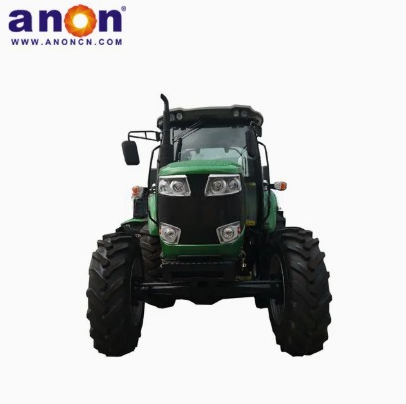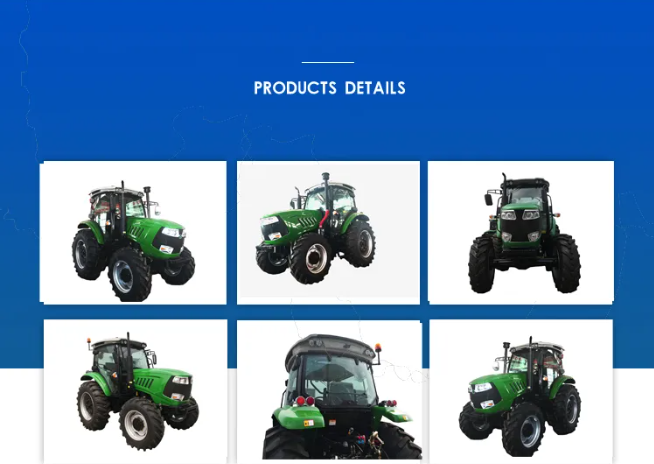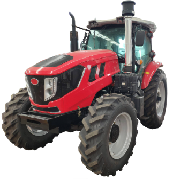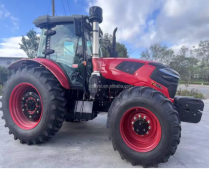ANON provides the 165 HP 4WD tractor AN1654 with 165 HP for medium to large-scale farm use. The highlight of this model is its superior traction at 66 kN. Specially designed for connecting large and heavy agricultural equipment to easily finish heavy-duty projects. It will suit you well if you are looking for a 165 HP 4WD tractor with relatively high horsepower and strong traction.

Specification
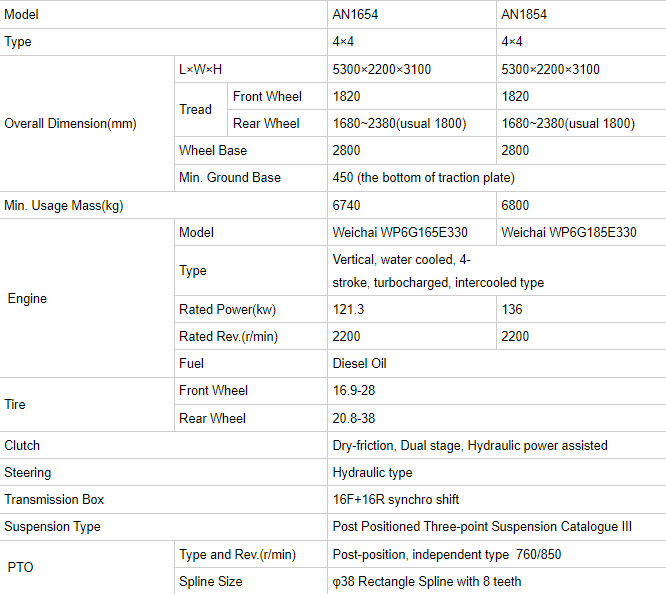
Features&Benefits
Extreme Traction
Among 4WD tractors with 150-180HP, the traction of 66KN is super high. Whatever the heavy-duty work you need to finish or the heavy agricultural equipment you want to connect, this 165 HP 4WD tractor AN1654 with such outstanding traction can perfectly satisfy all your requirements.
Strong Torque and Power Output
6-cylinder Turbo Engine
The 6-cylinder engine, with more fundamental displacement support, is more powerful than the 4-cylinder type. During the engine works, more air can be injected into the cylinder by turbo supercharging. ANON 165 HP 4WD tractor AN1654 is equipped with a 6-cylinder engine because of the two advantages.
Excellent Fuel Economy
The Electronically Controlled High-Pressure Common Rail System
Its function is to increase the injection pressure. Such a system in the 165 HP 4WD tractor AN1654 can make the machine have enhanced atomization efficiency.
The electronic control unit (ECU) system
Tis ECU system can benefit in delivering the fuel more accurately and efficiently. So even with the 165 HP, you do not need to be concerned about the fuel waste with the 165 HP 4WD tractor AN1654.
High Compatibility for Agricultural Equipment
By offering two different output speeds, ANON 165 HP 4WD tractor AN1654 can efficiently and accurately operate a wider variety of farm implements.
Dual-speed PTO
Different types of agricultural tools require different optimal input speeds to achieve maximum working efficiency. This mainly differs from their varying designs and operating principles. Our 165 HP 4WD tractor AN1654 with the dual-speed PTO, however, supports almost all implements for great compatibility.
540/1000 rpm: most mainstream and widely used
This mode on the 165 HP 4WD tractor AN1654 can perfectly satisfy both requirements for the most traditional 540 rpm farm equipment and modern, high-performance 1000 rpm equipment.
Provides ample power transmission capacity for large agricultural equipment, such as large round bale harvesters and large seed drills.
When using a 1000 rpm PTO shaft to drive agricultural implements that only require 540 rpm, the engine can operate at a lower speed automatically. You will not need to be afraid of wasting the fuel.
Applicable scenarios: Almost all general farms that require using various kinds of farm equipment. It is now standard equipment on most medium and large-sized tractors worldwide.
540/760 rpm: Ultimate cost-effectiveness
When selecting the 760 rpm gear, the PTO output still needs to keep 540 rpm to drive the agricultural equipment. But under these circumstances, the engine of the 165 HP 4WD tractor does not need to reach its rated speed, like 2200 rpm. It only needs to operate at approximately 1600 rpm to achieve a PTO output of 540 rpm.
Application scenarios: Primarily suitable for small to medium-sized tractors. It can also be used for users who primarily use traditional 540 rpm agricultural implements and are very sensitive to fuel costs. Although it can not drive 1000 rpm equipment, but offers the advantage of extremely high fuel efficiency.
760/850 rpm: Completely focused on cost-effectiveness
It is called the dual economy mode. Both 760 and 850 refer to different “economy settings” that allow the PTO to achieve 540 rpm output at different engine speeds. This offers two levels of fuel efficiency for the 165 HP 4WD tractor.
Applicable scenarios: Primarily used in specific markets or for older models of tractors, where 850 rpm may have been a standard. It is now not commonly used, except for some small or specialized tractors.
Three-point Hitch
Lift arms and lift links
With reliable materials of origin, ANON can ensure the quality as well as the ability to operate heavy implements of the 4WD tractor AN1654.
Hydraulic System
Fast transmission and accurate control capacity enable the operator to adjust the implement easily with this 4WD tractor AN1654.
Double Clutch
It divides the traditional single clutch function into two separate systems. Using one clutch pedal to control two independent clutch mechanisms. The 165 HP 4WD tractor AN1654 with the double clutch can achieve more convenient operation in your practical work.
Main Clutch
To connect or disconnect power to the transmission to control the wheel movement of the 165 HP 4WD tractor.
PTO Clutch
To connect or disconnect power to the PTO shaft to control the agricultural equipment connection to the 165 HP 4WD tractor.
These two clutches are integrated together, but can be operated separately or simultaneously. You can control them on this 165 HP 4WD tractor AN1654 by using different pedal travel distances or different pedal pressures.
Efficient and Multi-functional Operation
16F+16R transmission
This transmission system allows one 165 HP 4WD tractor to handle both light-duty tasks requiring precise speed control and heavy-duty tasks requiring high traction power. That means wherever you are conducting gardening or deep plowing, the gearbox with a wide speed range can always serve you well. This versatility reduces the need for your farms to invest in multiple specialized machines.
Besides, such a transmission on the 165 HP 4WD tractor AN1654 can also bring convenient operation to you. The traditional type usually requires operators to press the clutch, stop the vehicle, or interrupt the power transmission. However, such an advanced transmission system allows operators to switch between the 4 gears simply by pressing a button or toggling a switch. In this way, continuous power output can be ensured.
Outstanding Smoothness and Low Vibration
Apart from generating strong power, the inline 6-cylinder type is also regarded as a highly smooth structure.
Moreover, the pre-injection technology and high-accuracy gear train can perform well at lowering noise levels.
The combination of the structure and technology can help the engine of the 165 HP 4WD tractor work more smoothly with lower vibration and noise.
The lower vibration also means that less abrasion and pressure will be put on the engine and other elements. So you will not get annoyed by a loud voice and poor quality with this 165 HP 4WD tractor AN1654.
Comfortable Operator Station
Cab with AC
The operator can work in a comfortable environment with the professionally designed cabinet of ANON 165 HP 4WD tractor. The AC has been installed, and you do not need to pay an additional customizing fee for this function. With the ergonomic operating station, your operator can work efficiently for a longer time.
FAQ
Q: Can you list some specific implements run at 540 rpm and 1000 rpm?
A: Glad to help you. Some related agricultural implements that can be used with ANON 165 HP 4WD tractor AN1654 have been listed below for your reference.
540 rpm: rotary tiller
small baler
fertilizer spreader
post-hole digger
many older implements
1000 rpm:
large square baler
high-capacity rotary cutter
forage harvester
large fertilizer spreader
Q: How to operate the double clutch with this 165 HP 4WD tractor?
First step to disconnecting the drive system of the 165 HP 4WD tractor AN1654:
When you lightly press the clutch pedal, the main clutch disconnects first.
Effect: The power transmission to the gearbox is cut off, the tractor loses its drive power, allowing you to shift gears or stop. However, the PTO (Power Take-Off) remains engaged, and the implement (such as the rotary tiller blades or water pump impeller) continues to rotate.
Second step to disconnect the PTO system of the 165 HP 4WD tractor:
When you continue pressing the pedal until it reaches the bottom, the secondary clutch (PTO clutch) disconnects.
Effect: The PTO power is also cut off, and the implement stops rotating.
Third step to releasing the pedal of the 165 HP 4WD tractor:
First, release the pedal to the bottom position; the PTO power engages, and the implement starts rotating.
Then, continue releasing the pedal halfway; the drive power engages, and the tractor starts moving.
Q: How should I choose between your 160 HP 4WD tractor and 165 HP 4WD tractor?
A: Although the two 4WD tractors have similar horsepower, the other specifications and highlighted advantages are different. You can choose according to your detailed requirements. The main difference can be listed for your reference. It is better to consult with our sales for more details.
The AN1604-D’s 16+8-speed transmission is sufficient for most applications. However, the AN1654 can offer a wider and more comprehensive speed range. The increased range means more precise speed control. When working in complex soil conditions or requiring delicate work, the wider range of options can be an important benefit for your operation.
If your work is mainly in a large area or requires frequent high-load operations such as deep tilling, heavy harrowing, and land clearing, the 165 HP 4WD tractor AN1654 has stronger traction to ensure greater efficiency. Its ample power reserve also makes the machine more effortless at the same workload.
But if your operations are more about conventional rotary tillage, seeding, and tillage in confined areas, the AN1604-D’s 160 HP can be sufficient for your regular operations. What’s more, its smaller size and higher minimum ground clearance allow for greater flexibility and convenience.
ANON Our Services


